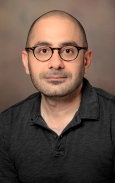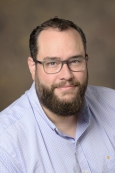Professor, Cellular and Molecular Medicine
Vice Dean, Strategy and Innovation
Professor, Applied Biosciences GIDP
Professor, Cancer Biology GIDP
Professor, Molecular and Cellular Biology
Professor, Radiation Oncology
(520) 626-7553
Studying the molecular mechanisms of human cancer progression and metastasis and the regulation of cell surface adhesion molecules, called integrins.
|
Professor, Cellular and Molecular Medicine
Chair, Genetics GIDP
Co-Program Leader, Cancer Biology Research Program
Professor, Cancer Biology GIDP
(520) 626-7979
Analyzing genomic instability in cancer susceptibility.
|
Professor, Cellular and Molecular Medicine
Chair, Cancer Biology GIDP
Co-Program Leader, Cancer Biology Research Program
Professor, BIO5 Institute
(520) 626-2269
Defining the mechanisms by which cell adhesion and the tumor microenvironment promote prostate cancer progression and metastasis.
|
Associate Professor, Cellular and Molecular Medicine
Associate Professor, Cancer Biology GIDP
(520) 626-4616
Understanding How Cytoskeletal Architecture Regulates Cancer Metastasis
|
Professor, Cellular and Molecular Medicine
Associate Head, Faculty Development
Professor, BIO5 Institute
Professor, Cancer Biology GIDP
Professor, Genetics GIDP
Professor, Molecular and Cellular Biology
(520) 626-3925
Understanding cellular mechanisms that control genomic integrity.
|
Associate Professor, Cellular and Molecular Medicine
Director, Graduate Program in Molecular Medicine
Associate Professor, BIO5 Institute
(520) 626-0395
Combining chemical biology and computer vision approaches to discover cellular communication mechanisms controlling cell fate, self-organization and disease progression of regenerative tissues
|
Professor, Cellular and Molecular Medicine
Director, Willed Body Program
Professor, BIO5 Institute
Professor, Cancer Biology GIDP
Professor, Neuroscience GIDP
(520) 626-2557
The Wilson laboratory works on the establishment and maintenance of the integrity of the intestine through the regulation of membrane trafficking to the apical plasma membrane domain.
|








